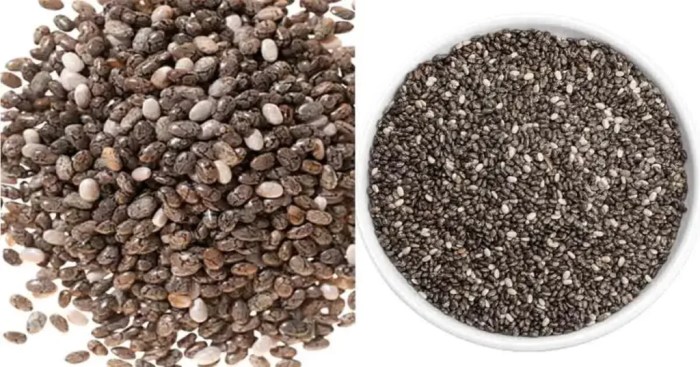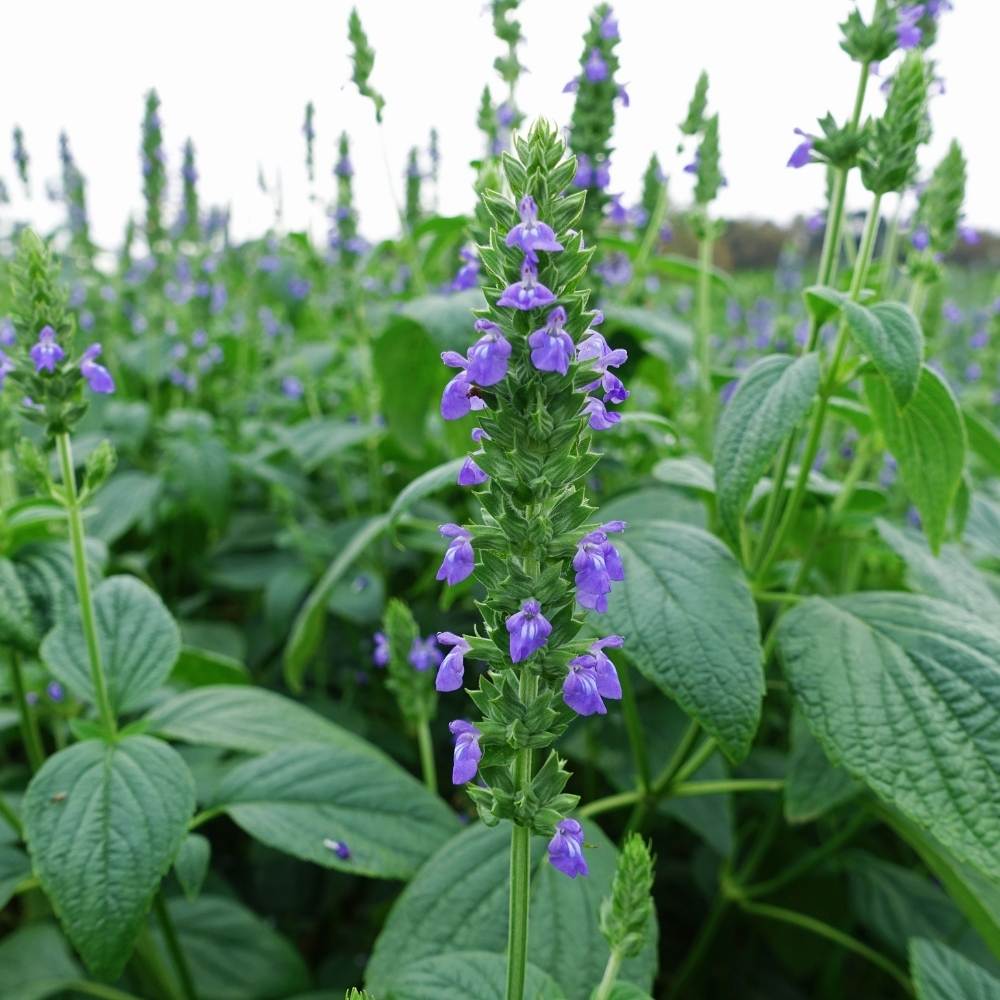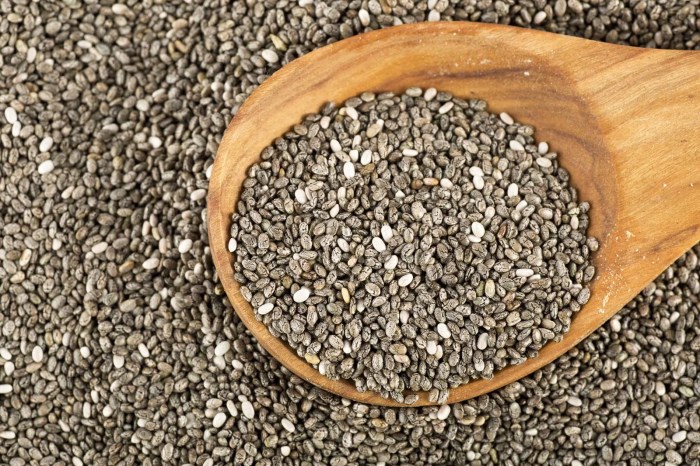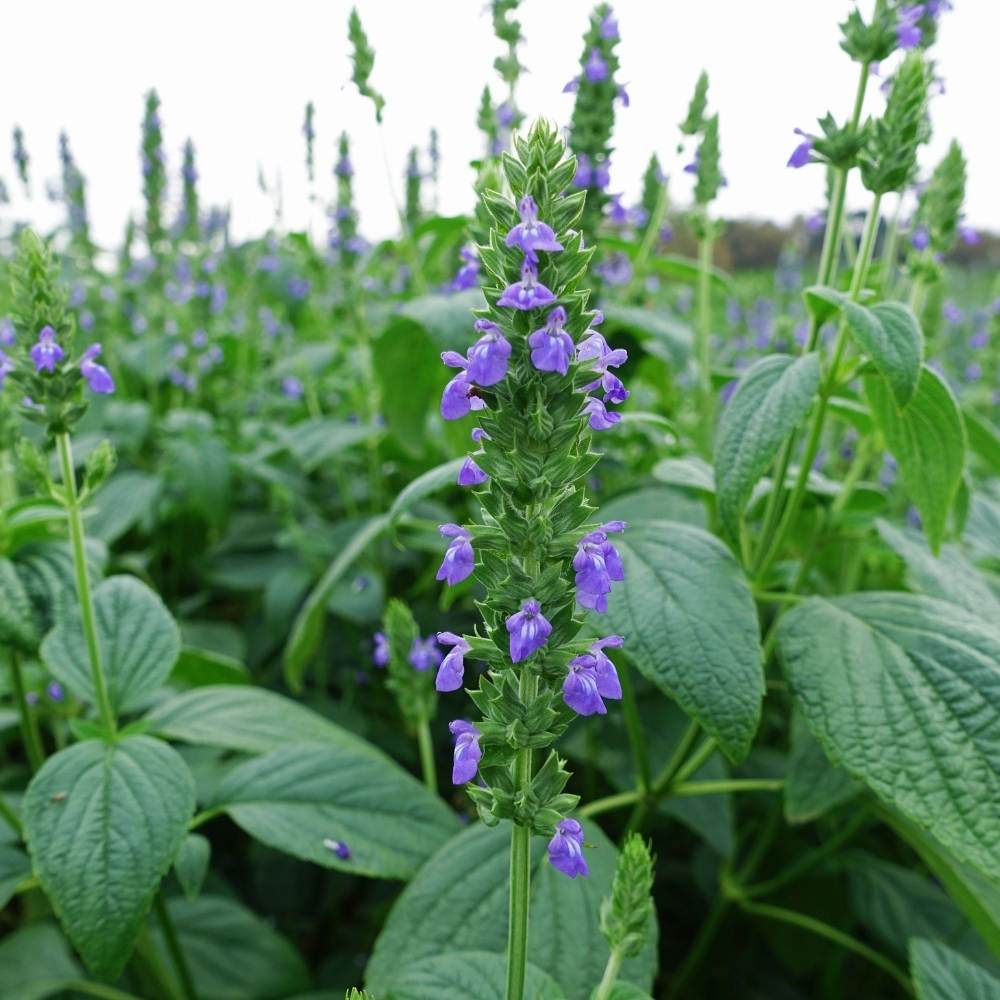Chia seeds and lemon water: a refreshing and potentially beneficial drink combination. This guide delves into the preparation, nutritional profile, potential health benefits, potential drawbacks, recipes, scientific research, practical applications, and interactions with other foods. We’ll explore the history, different types of chia seeds, and how to seamlessly incorporate this elixir into your daily routine.
From a simple morning pick-me-up to a meal enhancer, chia seeds and lemon water offer a versatile and healthy way to boost your well-being. This in-depth exploration will cover everything from the nutritional content to the potential health benefits, allowing you to make informed choices about incorporating this drink into your diet.
Introduction to Chia Seeds and Lemon Water
Chia seeds, tiny black or brown seeds from the Salvia hispanica plant, are a nutritional powerhouse. Packed with fiber, omega-3 fatty acids, and protein, they’ve gained popularity as a healthy addition to diets. Paired with the tangy zest of lemon, chia seeds and lemon water offers a refreshing and potentially beneficial drink. This combination is often touted for its potential to aid hydration, digestion, and overall well-being.Lemon water, a simple beverage, involves adding fresh lemon juice to water.
The combination of chia seeds and lemon water is a popular choice for those seeking a nutritious and flavorful way to start their day or maintain hydration throughout the day. The unique flavor profile and potential health benefits make it a desirable option for many.
Preparation Method
The preparation of chia seeds and lemon water is straightforward. Simply combine 1-2 tablespoons of chia seeds with 8 ounces of water. Add the juice of half a lemon, or more to taste. Stir well and let the chia seeds absorb the water for at least 5 minutes, or preferably overnight in a refrigerator. The chia seeds will swell and create a gel-like consistency.
This allows the body to absorb the nutrients more effectively. This method is suitable for both immediate consumption and overnight soaking.
Common Uses and Purposes
Chia seeds and lemon water are often consumed for their potential health benefits. Many believe it aids in weight management by promoting satiety and boosting metabolism. The high fiber content of chia seeds can contribute to better digestion and regularity. Lemon’s vitamin C content and potential to aid in hydration are also frequently cited as advantages. This combination is commonly incorporated into detox or weight loss regimens, although individual results may vary.
Historical Context
While the exact historical context of combining chia seeds and lemon water is unclear, both chia seeds and lemon have long been used in traditional medicine for various purposes. Chia seeds have been a staple food in Mesoamerican cultures for centuries, valued for their nutritional content. Lemon’s use in various cultures for its medicinal and culinary properties is also well-documented.
I’ve been loving my daily chia seeds and lemon water routine lately! It’s a simple way to boost my metabolism and feel energized. Finding healthy ways to lose body fat is key, and incorporating foods like chia seeds can definitely help. how to lose body fat is a complex issue, but the combination of chia seeds and lemon water can be a great starting point for a balanced approach.
The fiber in the chia seeds keeps me feeling full, and the lemon water helps with digestion, making it a win-win for my overall well-being. It’s definitely a small change that’s making a big difference.
The specific combination of the two is a more modern practice, likely a result of the increasing awareness of the nutritional benefits of each component.
Types of Chia Seeds and Potential Effects
| Type of Chia Seed | Potential Effects |
|---|---|
| Organic Chia Seeds | Often perceived as having more concentrated nutrients due to the lack of pesticides or fertilizers during growth. |
| Non-GMO Chia Seeds | May appeal to consumers who prioritize avoiding genetically modified organisms. |
| Black Chia Seeds | Generally similar in nutritional profile to other chia seeds. Potential for slightly varied textures in the final product. |
| Brown Chia Seeds | Generally similar in nutritional profile to other chia seeds. Potential for slightly varied textures in the final product. |
The table above offers a brief overview of different types of chia seeds and potential characteristics. Further research is recommended for a deeper understanding of the specific effects of each type.
Nutritional Composition
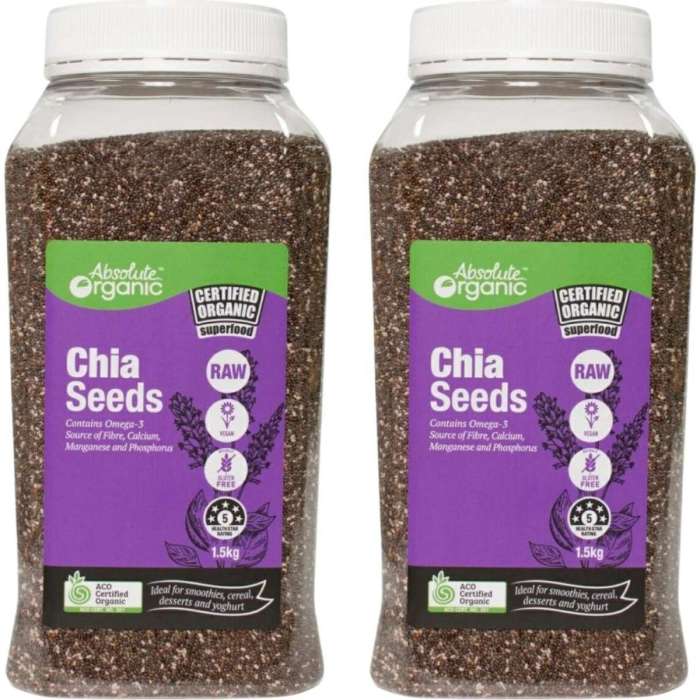
Chia seeds and lemon water, a popular health trend, offer a combination of nutrients that contribute to overall well-being. Understanding the nutritional profile of each ingredient is key to appreciating the potential benefits of this pairing. This section delves into the nutritional makeup of chia seeds, lemon, and the combined impact on health.
Chia Seed Nutritional Profile
Chia seeds are incredibly nutrient-dense, packed with essential nutrients. They are a complete source of plant-based protein, containing all nine essential amino acids. Their high fiber content aids digestion and promotes satiety, making them beneficial for weight management. They also contain significant amounts of healthy fats, primarily omega-3 fatty acids, which are crucial for heart health and brain function.
Lemon Nutritional Profile
Lemons are a citrus fruit renowned for their vibrant flavor and nutritional value. Rich in vitamin C, they play a vital role in immune function and collagen production. They also contain smaller amounts of other essential vitamins and minerals. The citric acid in lemons contributes to their tartness and aids in digestion.
Comparative Analysis of Combined Nutritional Value
Combining chia seeds and lemon water provides a synergistic effect. Chia seeds offer a potent blend of protein, fiber, and healthy fats, while lemon contributes vitamin C and antioxidants. This combination supports various bodily functions, from immune health to digestion. The water acts as a carrier for both ingredients, facilitating absorption of nutrients.
Potential Health Benefits
The combined nutrients in chia seeds and lemon water offer several potential health benefits. The fiber in chia seeds promotes regular bowel movements and helps manage cholesterol levels. The vitamin C in lemon strengthens the immune system. The omega-3 fatty acids in chia seeds contribute to heart health. The antioxidants in both ingredients help protect cells from damage.
Key Vitamins, Minerals, and Antioxidants
| Nutrient | Chia Seeds | Lemon |
|---|---|---|
| Protein | High | Low |
| Fiber | High | Low |
| Omega-3 Fatty Acids | High | Trace |
| Vitamin C | Low | High |
| Vitamin B Complex | Moderate | Moderate |
| Antioxidants | Moderate | Moderate |
| Calcium | Moderate | Low |
| Iron | Moderate | Trace |
| Potassium | Moderate | Moderate |
This table summarizes the key vitamins, minerals, and antioxidants present in both chia seeds and lemon. It highlights the diverse nutrient contributions of each ingredient, showcasing the potential benefits of consuming them together. The nutritional value varies depending on factors such as the specific type of chia seeds and lemon. Always consult a healthcare professional for personalized advice.
Potential Health Benefits
Chia seeds and lemon water, a simple yet potent combination, offer a range of potential health benefits. Their unique nutritional profiles, when combined, can contribute to various aspects of well-being. This blend, easily incorporated into a daily routine, can positively influence digestion, weight management, hydration, and blood sugar control.
Digestive Health
Chia seeds are renowned for their high fiber content, which plays a crucial role in promoting healthy digestion. The insoluble fiber in chia seeds adds bulk to the stool, facilitating smoother bowel movements and preventing constipation. The soluble fiber, on the other hand, can absorb water, creating a gel-like substance that helps regulate bowel movements and promotes a feeling of fullness.
Lemon, while not a significant source of fiber, contributes to digestive health through its acidity. This acidity can help stimulate the production of digestive enzymes, which further aid in the breakdown of food. This combined effect can lead to a more regular and efficient digestive system.
Weight Management
The high fiber content of chia seeds contributes to a feeling of fullness, which can help manage appetite and reduce calorie intake. This satiety effect is crucial for individuals aiming to lose or maintain a healthy weight. The fiber also slows down the absorption of nutrients, preventing blood sugar spikes that can trigger cravings. The low calorie count of both chia seeds and lemon water makes them suitable for weight management strategies.
The combination of these properties can contribute to weight management by promoting satiety, slowing nutrient absorption, and reducing calorie intake.
Hydration
Lemon water, a popular choice for hydration, provides a refreshing and invigorating way to consume fluids. The hydration benefits are further enhanced by the presence of chia seeds, which can absorb significant amounts of water. This characteristic aids in maintaining adequate hydration levels throughout the day. Drinking lemon water and consuming chia seeds is a natural way to stay hydrated and avoid dehydration.
Blood Sugar Control, Chia seeds and lemon water
The high fiber content in chia seeds can help regulate blood sugar levels by slowing down the absorption of carbohydrates. This gradual release of glucose into the bloodstream prevents blood sugar spikes, which can be beneficial for individuals with diabetes or those looking to manage their blood sugar levels. The presence of antioxidants in both chia seeds and lemon may further contribute to maintaining healthy blood sugar levels by fighting off harmful free radicals that can disrupt metabolic processes.
Potential Benefits Summary
| Bodily Function | Potential Benefit |
|---|---|
| Digestion | Improved bowel regularity, reduced constipation, enhanced digestion |
| Weight Management | Increased satiety, reduced calorie intake, controlled appetite |
| Hydration | Increased fluid intake, improved hydration levels |
| Blood Sugar Control | Regulated blood sugar levels, prevention of spikes |
Potential Drawbacks and Considerations
While chia seeds and lemon water offer numerous potential health benefits, it’s crucial to acknowledge potential drawbacks and considerations. Understanding these aspects can help you make informed choices and ensure safe consumption. This section will explore potential side effects, interactions, and allergic reactions associated with both chia seeds and lemon water, providing a comprehensive overview of their use.
Potential Side Effects of Chia Seeds
Chia seeds, despite their nutritional value, can pose certain side effects if not consumed appropriately. High intakes can lead to digestive issues like bloating, gas, and diarrhea in some individuals. This is often attributed to the high fiber content of chia seeds, which can be challenging for the digestive system to process quickly. Some individuals may experience a feeling of fullness or slight discomfort after consuming a large quantity of chia seeds.
Potential Side Effects of Lemon Water
Lemon water, while generally considered safe, can cause some adverse effects in certain situations. Consuming large quantities of lemon water, especially on an empty stomach, may lead to tooth enamel erosion due to the acidity of lemon juice. This is more prevalent in individuals with pre-existing dental conditions. Also, some people may experience heartburn or acid reflux from the high acidity, particularly those with a sensitive stomach.
Potential Interactions with Medications or Other Health Conditions
Chia seeds and lemon water can interact with certain medications and health conditions. For example, individuals taking blood-thinning medications should consult their doctor before consuming large amounts of chia seeds due to their potential impact on blood clotting. Similarly, those with digestive issues like irritable bowel syndrome (IBS) or gastroesophageal reflux disease (GERD) may experience worsened symptoms if they consume high amounts of chia seeds or lemon water.
Potential Allergic Reactions
Both chia seeds and lemon may trigger allergic reactions in susceptible individuals. Chia seeds, being a seed, can potentially cause allergic reactions similar to those from other seeds, like peanuts or sesame. Similarly, allergies to citrus fruits, including lemons, are possible. Symptoms of allergic reactions can range from mild skin rashes to severe anaphylactic reactions. It’s important to be aware of any existing allergies before incorporating chia seeds or lemon water into your diet.
Summary of Potential Risks and Precautions
| Potential Risk | Precautions |
|---|---|
| Digestive issues (bloating, gas, diarrhea) | Start with small portions of chia seeds and gradually increase intake. |
| Tooth enamel erosion | Drink lemon water in moderation and rinse your mouth after consumption. |
| Heartburn/Acid reflux | Avoid consuming lemon water on an empty stomach. |
| Medication interactions | Consult with a doctor before consuming chia seeds or lemon water if you’re taking blood thinners or have underlying health conditions. |
| Allergic reactions | Be mindful of pre-existing allergies to chia seeds, lemon, or similar substances. |
Recipes and Variations
Chia seeds and lemon water are fantastic as a basic health drink, but the possibilities for delicious and nutritious variations are endless. Adding different ingredients can enhance the taste and nutritional profile, catering to various dietary needs and preferences. From savory options to sweet treats, the adaptability of this simple combination is truly remarkable.This section explores a variety of recipes and variations, demonstrating how to adjust the base recipe to suit individual tastes and dietary requirements.
We’ll also examine how incorporating different herbs, spices, and sweeteners can create a personalized experience.
Chia Seed and Lemon Water Recipes
Chia seeds’ remarkable ability to absorb liquids makes them a versatile addition to numerous beverages. The addition of lemon water provides a refreshing twist, and together, they create a nutritious and tasty base for many recipes.
- Basic Chia Seed and Lemon Water: Simply combine chia seeds with warm or cold water and lemon juice. The chia seeds will absorb the liquid, creating a pudding-like consistency over time. This is a simple yet effective way to increase your daily intake of fiber and healthy fats.
- Berry Blast Chia Seed Pudding: Combine chia seeds with a cup of your favorite berry smoothie, lemon juice, and a touch of honey or maple syrup for sweetness. This recipe provides a delightful blend of antioxidants and nutrients. Blend the berries until smooth for a creamy texture. This variation can be easily adjusted for those with specific dietary needs by substituting the sweetener with a sugar-free alternative.
- Spicy Mango Chia Seed Drink: This vibrant drink combines the sweetness of mango with a hint of spice. Blend mango chunks with a splash of lemon juice, a pinch of ginger, and chia seeds. This recipe provides a refreshing twist on the classic chia seed and lemon water. For those watching their sugar intake, use stevia or monk fruit as a sweetener.
Flavor Variations
The basic recipe allows for a wide array of flavor profiles, making it a customizable drink.
| Flavor Variation | Herbs/Spices | Sweeteners | Notes |
|---|---|---|---|
| Citrus Burst | Orange zest, lime juice | Honey, maple syrup | A zesty and refreshing twist. |
| Mint Medley | Fresh mint leaves | Stevia, agave | A cooling and aromatic combination. |
| Ginger Zing | Fresh ginger | Monk fruit | Adds a warm and spicy kick. |
| Tropical Fusion | Pineapple chunks, coconut flakes | Coconut sugar, dates | A delicious and exotic flavor profile. |
| Savory Spinach | Spinach, basil | Salt, pepper | A healthy and savory option for a meal replacement. |
Adding a dash of cinnamon, cardamom, or nutmeg can elevate the flavor profile of the drink, while a pinch of turmeric can offer potential health benefits.
Adjusting for Dietary Needs
This drink is adaptable to various dietary needs. Those following a vegan or vegetarian diet can easily incorporate this drink into their routine. For those with specific allergies or sensitivities, it’s essential to check the ingredients carefully and adjust the recipe accordingly. For example, ensure you are using a suitable sweetener if you have a specific allergy.
Scientific Research and Studies
The world of health and wellness is brimming with claims, making it crucial to look beyond anecdotal evidence and delve into the scientific backing behind certain practices. Understanding the methodology and findings of scientific studies on chia seeds, lemon water, and their combined use is vital for informed decisions about incorporating them into one’s diet.
Chia Seed Studies
Chia seeds, with their impressive nutritional profile, have attracted considerable scientific interest. Research consistently highlights their potential benefits. Studies often investigate their impact on various health markers, from blood sugar control to digestive health. Key areas of study often involve assessing their effects on satiety, blood pressure, and inflammation. Animal and human trials frequently examine the effects of varying dosages and formulations.
- One area of research focuses on the impact of chia seeds on cardiovascular health. Studies have explored the potential of chia seeds to lower cholesterol levels and improve blood pressure. For example, a 2018 study published in the Journal of Agricultural and Food Chemistry investigated the effect of chia seed supplementation on lipid profiles in rats. The results suggested that chia seed consumption could contribute to a healthier lipid profile.
- Another line of investigation explores the role of chia seeds in managing blood sugar levels. Some research indicates that chia seeds may help regulate blood glucose response, particularly after meals. A 2020 study published in the journal Nutrients investigated the impact of chia seeds on glucose tolerance in diabetic rats. The study observed that chia seeds contributed to improved glucose control.
- Furthermore, research has examined the potential benefits of chia seeds for digestive health. The high fiber content in chia seeds may promote regularity and improve digestive function. One study in the journal Food Chemistry analyzed the prebiotic effects of chia seeds, suggesting a potential role in promoting gut health.
Lemon Water Studies
The popularity of lemon water stems from perceived health benefits, though scientific evidence supporting these claims is varied. Many studies investigate the potential effects of lemon water on hydration, digestion, and overall well-being.
- A key area of research is the impact of lemon water on hydration. While lemon water may aid in hydration, it is not a primary source of hydration compared to plain water. Some studies suggest that lemon’s potential to stimulate digestion might contribute to better hydration.
- Another area of research explores the potential effects of lemon water on digestion. The acidity of lemon juice might stimulate stomach acid production, potentially aiding in digestion. A review of existing research published in a reputable journal highlighted the role of citric acid in enhancing digestive function, but further large-scale human trials are needed.
Combined Consumption Studies
Limited research specifically examines the combined effects of chia seeds and lemon water. While some studies might touch upon the impact of either component on a related health outcome, definitive conclusions on their synergistic effects are lacking.
- The limited research on the combined consumption of chia seeds and lemon water makes it challenging to draw definitive conclusions about their combined effects on health. Further research is needed to explore this interaction more comprehensively.
Methodology in Research
The methodology employed in studies varies significantly. Some studies use animal models, while others employ human subjects. Control groups, placebo groups, and standardized dosages are frequently utilized to ensure the reliability of findings. The duration of the study, the type of diet followed by participants, and the specific measurements taken also vary considerably. It’s important to scrutinize the methodology to assess the validity and generalizability of the results.
Key Findings Summary
| Study Focus | Key Findings | Methodology |
|---|---|---|
| Chia Seed Impact on Cardiovascular Health | Potential for lowering cholesterol and improving blood pressure | Animal and human trials, varying dosages |
| Chia Seed Impact on Blood Sugar | Potential for regulating blood glucose levels | Human and animal studies, controlled diets |
| Chia Seed Impact on Digestive Health | Potential for promoting regularity and gut health | Analysis of prebiotic effects, human trials |
| Lemon Water Impact on Hydration | Potential to aid hydration, but not a primary source | Observation of hydration levels, human trials |
| Lemon Water Impact on Digestion | Potential to stimulate digestion through acidity | Review of existing research, human trials |
| Combined Consumption of Chia Seeds and Lemon Water | Limited research, no definitive conclusions on synergistic effects | Limited research, variable methodology |
Practical Applications and Usage
Chia seeds and lemon water offer a versatile and refreshing way to enhance your daily routine. This simple combination provides a convenient source of nutrients and antioxidants, easily integrated into various aspects of your diet and lifestyle. The unique properties of chia seeds and the invigorating citrus note of lemon make it a popular choice for those seeking a healthy and flavorful hydration option.This section details practical applications of this drink, demonstrating how to seamlessly incorporate it into your daily routine, various meals, and optimal consumption times.
Understanding the best methods for incorporating this drink into your lifestyle will maximize its potential benefits and ensure a sustainable approach to healthy hydration.
Incorporating Chia Seeds and Lemon Water into Your Daily Routine
This simple drink can be a vital component of a healthy daily routine. Consistency is key to reaping the most benefits. Aim for regular consumption, ideally throughout the day. Start your day with a glass to kickstart your metabolism and hydrate. You can also have it mid-morning, midday, or after lunch to maintain hydration and energy levels.
Using Chia Seeds and Lemon Water in Different Meals
Chia seeds and lemon water can complement various meals. Their mild flavor profile allows them to enhance different cuisines.
- Breakfast: A refreshing start to the day. Mix a spoonful of chia seeds into your morning smoothie or yogurt for added fiber and omega-3s. The lemon water can be consumed separately or added to the smoothie.
- Lunch: Enjoy a light and healthy lunch by incorporating chia seeds and lemon water into salads. This combination adds a vibrant flavor and a boost of nutrients.
- Dinner: Enhance your dinner with a side of chia seeds and lemon water. The combination can add a refreshing element to various dishes, such as roasted vegetables or quinoa salads. The water can be consumed as a palate cleanser between courses.
- Snacks: A refreshing and satisfying snack. The seeds’ texture and the lemon’s zest add an interesting combination.
Examples of Meals Enhanced with Chia Seeds and Lemon Water
The combination can be integrated into various meal types. Here are a few examples:
- Breakfast Smoothie: Blend chia seeds, berries, spinach, banana, and almond milk. Add a squeeze of fresh lemon juice for a tangy twist. Enjoy a glass of lemon water alongside.
- Lemon Herb Roasted Chicken: Roast chicken with herbs and lemon slices. Pair with a side salad and a glass of chia seed and lemon water.
- Quinoa Salad: Combine cooked quinoa, chopped vegetables (cucumber, bell peppers, tomatoes), and a light vinaigrette. Add a tablespoon of chia seeds and a splash of lemon water for a flavorful and nutritious salad.
Best Times of Day to Consume the Drink
Timing is crucial for optimal benefits. The drink can be consumed throughout the day, with specific times potentially maximizing certain effects.
- Morning: Start your day with a glass of chia seed and lemon water to aid digestion and hydrate your system after sleep. It can help kickstart your metabolism.
- Mid-day: A mid-day glass can provide a refreshing boost and replenish lost hydration. It can help combat fatigue.
- Evening: Consume it in moderation, as it might affect sleep if taken too close to bedtime. It can be a hydrating alternative to sugary drinks.
Integration into a Healthy Lifestyle
The following table illustrates various ways chia seed and lemon water can be integrated into a healthy lifestyle.
| Time of Day | Usage | Benefits |
|---|---|---|
| Morning | Hydration, digestion aid | Improved energy levels, boosted metabolism |
| Mid-day | Hydration, focus enhancement | Combat fatigue, maintain energy |
| Afternoon | Refreshing snack, light meal companion | Increased nutrient intake, enhanced digestion |
| Evening | Hydration alternative | Maintain hydration without added sugar |
Potential Interactions with Other Foods
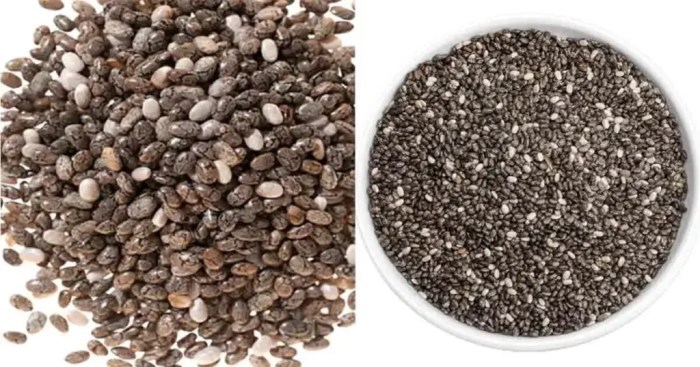
Chia seeds and lemon water, while generally considered healthy, can interact with certain foods and dietary supplements. Understanding these potential interactions is crucial for maximizing their benefits and minimizing any potential drawbacks. Careful consideration of your overall dietary habits is key when incorporating chia seeds and lemon water into your routine.
Potential Interactions with Other Foods
Chia seeds have a high fiber content and can absorb significant amounts of liquid. This can affect the digestion and absorption of other foods consumed around the same time. For example, consuming chia seeds immediately before or after meals rich in fat or protein might slightly alter the digestion process. Similarly, consuming large quantities of chia seeds with medications or supplements may influence their absorption.
Careful timing of consumption can mitigate these effects.
Potential Interactions with Specific Dietary Restrictions
Chia seeds are a good source of fiber and are generally well-tolerated. However, individuals with specific dietary restrictions should consult with a healthcare professional before incorporating them into their diet. For instance, those following a gluten-free diet should ensure that the chia seeds they consume are certified gluten-free to avoid any potential contamination. Similarly, individuals with allergies to certain foods, such as soy or nuts, should be cautious about the source of the chia seeds and any potential cross-contamination.
Effects on Blood Sugar Levels
Chia seeds are rich in soluble fiber, which can help regulate blood sugar levels. They can slow down the absorption of carbohydrates from other foods, potentially preventing blood sugar spikes after meals. However, the effect on blood sugar levels can vary depending on the individual and the type of foods consumed. People with diabetes should monitor their blood sugar levels closely when incorporating chia seeds into their diet.
Chia seeds and lemon water are a fantastic way to start your day, packed with nutrients. However, if you’re looking to boost your fiber intake even further, exploring other options like the foods listed in this article on 7 foods with more fiber than chia seeds might be beneficial. While chia seeds are a good source of fiber, these other options might provide even greater amounts, and could still complement your chia seeds and lemon water routine beautifully.
Effects on Blood Pressure Levels
Chia seeds contain omega-3 fatty acids, which are known to have positive effects on blood pressure. The fiber content in chia seeds can also contribute to a healthy digestive system, which is important for overall cardiovascular health. However, the effect on blood pressure levels can vary depending on the individual and the overall dietary pattern. It’s important to remember that chia seeds are not a substitute for prescribed medications or medical advice.
Chia seeds and lemon water are a fantastic way to kickstart your day, offering a healthy boost of fiber and antioxidants. But what about when you’re fasting? Understanding what breaks a fast is crucial for maintaining your dietary goals, and that’s where factors like food and drink come into play. This resource dives deep into the specifics.
Fortunately, chia seeds and lemon water, with their mild taste and gentle impact on your system, often make a great way to stay hydrated and satisfied during the fasting period without breaking your fast. So, if you’re looking for a hydrating and nutritious option to incorporate into your fast, chia seeds and lemon water are an excellent choice.
Summary Table of Potential Interactions
| Food/Supplement | Potential Interaction | Considerations |
|---|---|---|
| High-fat meals | May slightly alter digestion | Consume chia seeds separately from high-fat meals, or at least 30 minutes before or after. |
| High-protein meals | May slightly alter digestion | Consume chia seeds separately from high-protein meals, or at least 30 minutes before or after. |
| Medications/Supplements | May influence absorption | Consult with a healthcare professional to determine optimal timing for consumption. |
| Gluten-free diet | No known interaction, but check for certification | Ensure the chia seeds are certified gluten-free. |
| Allergies (e.g., soy, nuts) | Potential cross-contamination | Choose chia seeds from reputable sources and check for cross-contamination. |
| Blood sugar control | Can help regulate blood sugar | Monitor blood sugar levels closely if you have diabetes. |
| Blood pressure | May have a positive effect | Not a substitute for prescribed medications or medical advice. |
Images and Visual Representations
Visual aids play a crucial role in understanding and appreciating the benefits and practicality of incorporating chia seeds and lemon water into a healthy lifestyle. Images can transform abstract concepts into tangible representations, making the information more engaging and memorable. These visual representations can effectively communicate the preparation methods, nutritional value, and potential applications of this popular combination.
Visual Depiction of Chia Seeds and Lemon Water Preparation
A captivating image showcasing the preparation of chia seeds and lemon water would depict a clear glass pitcher or jar. Inside, the seeds would be gently mixed with freshly squeezed lemon juice. The image would ideally highlight the vibrant yellow of the lemon juice contrasting with the light brown of the chia seeds, emphasizing the fresh and natural ingredients.
The pitcher should be filled to approximately 3/4 of its capacity, and the background should be a soft, neutral tone, not distracting from the central ingredients. A subtle splash of water could be visible to suggest the dilution step. This image would easily convey the simplicity and speed of the preparation process.
Visual Representation of Chia Seed Nutritional Content
A visually appealing image illustrating the nutritional content of chia seeds could use a stylized infographic. The infographic would highlight key nutrients like fiber, protein, omega-3 fatty acids, and various vitamins and minerals. Each nutrient would be represented by a distinct icon or color-coded bar graph, with the percentage contribution to daily recommended intake clearly indicated. The graphic would be organized in a way that clearly showcases the substantial nutritional value of chia seeds, making it easily understandable for the reader.
Visual Representation of Lemon Nutritional Content
The image depicting the nutritional content of lemon should be a simple yet informative graphic. It could show a lemon cut in half or a whole lemon, and use a color-coded system to highlight the significant vitamin C content. The infographic would showcase the presence of other essential vitamins, minerals, and antioxidants. It would be well-structured, providing a concise overview of the benefits of incorporating lemons into one’s diet.
The graphic should be clear and not overly complex.
Visual Representation of Chia Seeds and Lemon Water Recipes
This image would display a variety of visually appealing recipes incorporating chia seeds and lemon water. It could feature several glass jars or containers, each showcasing a different recipe. The containers would be filled with various liquids (e.g., chia seed pudding, chia seed smoothie, chia seed-infused water with lemon), each with different colors and textures, showcasing the versatility of the combination.
The image should also include a short description of each recipe, highlighting the unique flavor profiles.
Visual Representation of Chia Seeds and Lemon Water Meal Incorporation
A compelling image showcasing how to incorporate chia seeds and lemon water into a meal would depict a balanced plate of food. The plate would feature a healthy portion of vegetables, a lean protein source, and a side of fruit or grains. A glass of chia seed and lemon water would be prominently placed alongside the plate. The image would emphasize the seamless integration of the drink into a balanced meal.
This would clearly demonstrate the drink as a refreshing accompaniment to a healthy and nutritious meal.
Conclusion: Chia Seeds And Lemon Water
In conclusion, chia seeds and lemon water present a compelling combination for a healthier lifestyle. While promising benefits abound, careful consideration of potential drawbacks and interactions with other foods is crucial. Experiment with the various recipes and find the perfect variations to enjoy this refreshing drink. Remember to consult with your doctor before making significant dietary changes, especially if you have pre-existing health conditions.
